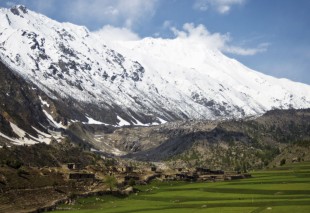

The pros and cons of local farming

Although local UAE farming might seem best practice, importing organic food can be better for the environment.
The first point to consider is “why do we want to farm locally in the UAE?” Is it to reduce our carbon footprint? Is it in order to retain more nutrients in our food? Is it to secure our food supply?
If it is any of these then I think we should harness the enthusiasm that is currently growing behind local farming and try to steer it in a more sustainable direction.
Let me tell you about the situation now and how I think we can improve on it.
Water availability
Most farms are drawing well-water to irrigate their crops. International organic standards say that the water has to be drinkable. This is not so in the case of the UAE, so the water is treated by reverse osmosis on some farms. That not only costs money but it takes out the salts from the water, which then drain back into the ground.
The effect is that we reduce the level of ground water and at the same time increase its level of saltiness. Water is a very critical resource and using it up in this way means that in a few years there will be no usable water left, neither for vegetables nor in the case of a food security emergency.
The other water source I have seen on farms is desalinated water. This currently has a carbon footprint that surpasses that of vegetables being flown in from much further afield than places such as Egypt, where I import my vegetables from.
My hope for the future? If we can harness solar energy to desalinate water we could have a huge renewable source of water that does not have a large carbon footprint.
At the very least water usage should be better controlled with subterranean irrigation and more organic matter in the soil to increase the water holding capacity and to reduce water consumption.
Local conditions
Most local UAE farms are close to large cities where the soils are not the best, yet within a short drive there are the more fertile soils such as those in the eastern region of Fujairah, Dibba and Khorfakkan.
Under the shade of date palms and close to the Indian ocean we could get really good quality crops high in nutritional values.
Another point in favour of this is that the plastic used to create green houses and tunnels all ends up as landfill after a few years, and yet they are commonplace on farms. With a more moderate climate or with natural tree cover, as traditionally done in farming areas with date trees, we would save that plastic in the land fills.
Composting should also be at the heart of every farm. It improves the quality of the soil and in turn that of the crop and also reduces the carbon footprint by trapping carbon in the soil and reducing the need for natural fertilisers, which have to be produced elsewhere and transported in.
Lastly, to date labour is largely imported to work on farms locally. This is not only a socially disrupting practice but on top of it the workers get flown home every year or two, which creates a carbon footprint that is not often accounted for.
Solution?
In the short term, building up farming locations that have natural resources that the UAE does not have, but are within close proximity, could work well.
For example take Pakistan: we have historically had very good ties to Pakistan and it would seem there is a slim risk of politically falling out.
There is plenty of labour at suitable wage rates to be conducive to farming and it would provide employment into Pakistan. There is enough good soil and, harnessed and managed well, the water supply is also ample in the country.
Longer term, the eastern region in the UAE already has dams and some farming and could be expanded. Given the right technology in solar desalination, the UAE could acquire the right water and soil resources.
The labour will remain the only factor not available locally, but we could opt for higher capital intensive farming. The enthusiasm behind local farming is a good start, but considering these factors would do us good in the long term.
Nils El Accad founded Organic Foods and Café with the goal of bringing good food to the Gulf in a sustainable way with the lowest ecological footprint.